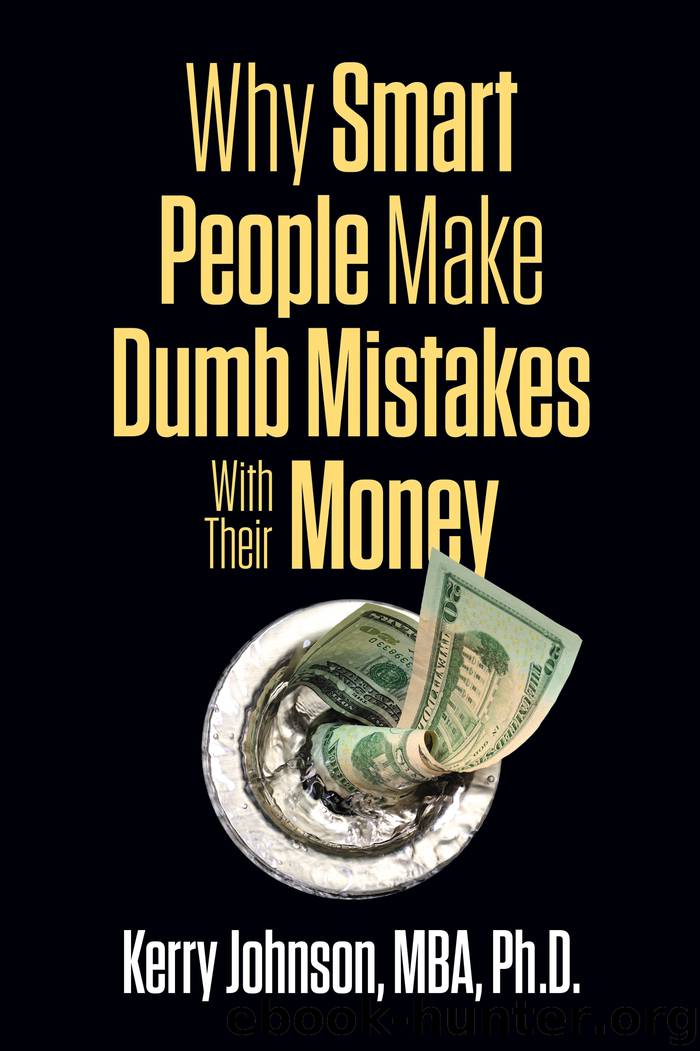Why Smart People Make Dumb Mistakes with Their Money by Kerry Johnson

Author:Kerry Johnson
Language: eng
Format: epub
Publisher: G&D Media
Published: 2019-01-23T16:00:00+00:00
TWENTY-TWO
Home Bias
Do you believe American stocks and bonds are safer and include better performance than international issues?
Do you feel more comfortable investing in areas you know instead of balancing your portfolio with investments less familiar? If you answered yes to these questions, you may be a victim of “Home Bias.”
Obviously, your portfolio needs to be properly balanced.
You need to have a well diversified portfolio with non-correlated assets. When one part of your portfolio tanks, the other should increase, making up for the loss. There are few exceptions to this, save the great 2008 recession. For nearly two years from 2007 to 2009, any asset class that could lose value did.
“I’ll stick to my knitting”
Yet what you may seem more familiar with in your portfolio may not be the best investment. The US stock market, as measured by market capitalization or total money invested, only accounts for 44% of the total global equity market. According to John Nofsinger, in his book The Psychology of Investing, even the most sophisticated of investors believe that domestic stocks will have a higher return and be safer than international ones. This is home bias. From 2008 until 2010, both Canada and Australian stock markets outperformed the US indexes. For most of 2009–2010, the Euro increased against the US dollar. The emerging markets of Brazil, China, India, and even Japan outperformed US indexes. The Chinese GDP in 2010 increased by 8% while the US GDP increased only 2.2%.
Another example of home bias is to invest in what you know. If you owned real estate for 20 years, you are likely to continue to be attracted to this asset class.
My wife Merita loves gold. Nearly every conversation we have about investing includes her fondness of gold.
One of my clients ten years ago was based in Korea Town in Los Angeles. He speaks Korean and focused his practice toward that community. I remember Jim telling me how difficult it was to get his clients to diversify past real estate. He couldn’t even bring them to consider life insurance.
On the one hand, home bias allows us to feel more confident, but allowing this bias creates more risk and decreases safety. Often investors mention their attraction toward bank CDs. Until recently, CDs paid less than 2% interest based on a six month term. Yet after inflation and taxes, they can actually lose money. But investors will rationalize the benefits of CDs because they are familiar.
Download
This site does not store any files on its server. We only index and link to content provided by other sites. Please contact the content providers to delete copyright contents if any and email us, we'll remove relevant links or contents immediately.
| Budgeting & Money Management | College & Education Costs |
| Credit Ratings & Repair | Retirement Planning |
The Compound Effect by Darren Hardy(8975)
Tools of Titans by Timothy Ferriss(8402)
Nudge - Improving Decisions about Health, Wealth, and Happiness by Thaler Sunstein(7711)
Win Bigly by Scott Adams(7202)
Deep Work by Cal Newport(7089)
Rich Dad Poor Dad by Robert T. Kiyosaki(6642)
Principles: Life and Work by Ray Dalio(6459)
Pioneering Portfolio Management by David F. Swensen(6303)
Digital Minimalism by Cal Newport;(5767)
The Barefoot Investor by Scott Pape(5750)
Grit by Angela Duckworth(5617)
The Slight Edge by Jeff Olson(5420)
Discipline Equals Freedom by Jocko Willink(5391)
The Motivation Myth by Jeff Haden(5214)
You Are a Badass at Making Money by Jen Sincero(4934)
The Four Tendencies by Gretchen Rubin(4606)
Eat That Frog! by Brian Tracy(4543)
The Confidence Code by Katty Kay(4265)
Bullshit Jobs by David Graeber(4195)
